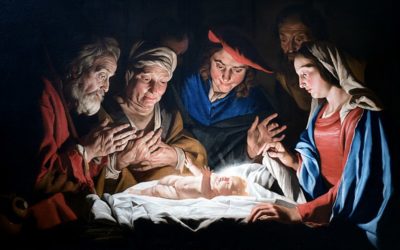With one exception, Doctrine and Covenants sections 98 to 101 cover from August 6 to mid-December 1833, a turbulent period in Church history. This period saw the Saints in Jackson County attacked; their bishop publicly kidnapped, beaten, tarred, and feathered; the printing of the scriptures disrupted; the print shop torn to the ground, and Church members driven heartlessly like cattle before armed mobs as winter approached.
Doctrine and Covenants 98
Although the Prophet Joseph Smith was aware of increasing tensions between the Saints and their neighbors in Missouri, he lived too far away from them in Ohio to know of the burst of violence in July 1833 when mobs attacked Church members and their property and warned them to leave the county or be subject to even greater violence.
Section 98 of the Doctrine and Covenants was received before word of this violence reached Joseph, and as the modern headnote to this revelation explains, “the seriousness of the situation could have been known to him at this date only by revelation.”
For further historical background on this section, click here.
In the wake of this violence, verses 1–3 offer comfort to the faithful and urge patience, reminding them that the “immutable covenant” made with the Lord “shall be fulfilled; and all things wherewith you have been afflicted shall work together for your good, and to my name’s glory.”
As a general rule, the Lord encourages the Saints, who were facing extralegal violence, to obey the law. In verse 4, He says, “concerning the laws of the land, it is my will that my people should observe to do all things whatsoever I command them.” Verses 5 and 6 especially encourage the Saints to befriend “that law of the land which is constitutional, supporting that principle of freedom in maintaining rights and privileges,” explaining that freedom “belongs to all mankind, and is justifiable before me.”
Verse 7, however, adds, “as pertaining to law of man, whatsoever is more or less than this, cometh of evil,” meaning that some laws passed may be unconstitutional, violating freedoms.
In verse 8, the Lord reminds the Saints of their God-given agency. “I, the Lord God, make you free,” He says, “therefore ye are free indeed; and the law also maketh you free.” But the freedom provided by the Lord and righteous laws can be violated by evil leaders. “When the wicked rule,” the Lord says in verse 9, “the people mourn.”
To help assure good laws and leaders, the Lord encourages the Saints in verses 9–11 to seek honest and wise political leaders and uphold them, “forsake all evil and cleave unto all good,” and “live by every word which proceedeth forth out of the mouth of God.”
And how are the Saints to respond if subject to violence while serving the Lord? “Whoso layeth down his life in my cause, for my name’s sake,” He promises in verse 13, “shall find it again, even life eternal.”
In the face of such violence, the Lord encourages the Saints not to fear but to “abide in my covenant, even unto death, that you may be found worthy” (verse 14).
Instead of fearing and responding with violence, the Lord commanded them in verse 16 to “renounce war and proclaim peace” and continue in doing His work.
In verses 19 to 22, the Lord delivers similar words of warning and promise to the Saints at Kirtland.
Then beginning with verse 23 and continuing to the end of the section, the Lord lays down a law on how to patiently bear violence before responding for self-defense. These verses justify war in the extremity, but only after patient efforts to prevent it.
Doctrine and Covenants 99
Section 99 is the one revelation in this group that does not fit in the latter half of 1833. It was given through the Prophet Joseph to John Murdock on August 29, 1832. After John’s wife died in childbirth, as did Joseph and Emma’s twins, John gave his newborn twins to the Smiths to replace theirs and provide the babies a means of support. He then began preaching the gospel. Section 99 calls him to continue preaching until such time as he wants to “go up also unto the goodly land to possess thine inheritance” (verse 7).
For additional background, click here.
Doctrine and Covenants 100
John Murdock was not the only missionary in those early days. Virtually all of the Church leaders received calls to preach the gospel at one time or another. On October 12, 1833, Joseph Smith and Sidney Rigdon were preaching in Perrysburg, New York, and—like many missionaries throughout history—began to worry about their families. Section 100 of the Doctrine and Covenants is a revelation provided to comfort them regarding their families and give them further instructions about their preaching mission.
Verse 1 tells them, “Your families are well; they are in mine hands, and I will do with them as seemeth me good; for in me there is all power.” The remaining verses focus them back on their mission.
In verses 3 and 4, the Lord tells them that many people in the region needed to hear the gospel and that they had been sent there “for the salvation of souls.”
Verses 5 and 6 tell the missionaries to “speak the thoughts that I shall put into your hearts, and you shall not be confounded before men; for it shall be given you in the very hour, yea, in the very moment, what ye shall say.”
For this to work, however, the missionaries needed to preach “in my name, in solemnity of heart, in the spirit of meekness” (verse 7). If they did so, the Lord promised, “the Holy Ghost shall be shed forth in bearing record unto all things whatsoever ye shall say” (verse 8).
Besides being missionaries, Joseph and Sidney were also members of the First Presidency, and they undoubtedly worried a lot about the Saints in Jackson County. In verse 13, the Lord provides comforting words about Zion. “Zion shall be redeemed,” the Lord promised, “although she is chastened for a little season” (verse 13).
Doctrine and Covenants 101
The revelation that is now section 101 of the Doctrine and Covenants builds on section 98 and the Lord’s counsel in it on how to respond to the violence of Missouri mobs. Given December 16 and 17, 1833, after mobs had run the Saints from Jackson County into surrounding regions, it contains both rebukes and promises.
“Concerning your brethren who have been afflicted, and persecuted, and cast out from the land of their inheritance,” verses 1‒3 declare, “I, the Lord, have suffered the affliction to come upon them, wherewith they have been afflicted, in consequence of their transgressions; yet I will own them, and they shall be mine in that day when I shall come to make up my jewels.” (See also verses 39‒42.)
Verses 4‒5 contain a general principle that applies to us all: “They must needs be chastened and tried, even as Abraham, who was commanded to offer up his only son. For all those who will not endure chastening, but deny me, cannot be sanctified.”
Verses 6‒17 point out the sins of many in Zion who were slow to hearken to the Lord when things were good but now turned to him in times of trouble. The Lord promised to have mercy on the truly repentant and ultimately to redeem Zion. “Therefore,” the Lord said in verse 16, “let your hearts be comforted concerning Zion; for all flesh is in mine hands; be still and know that I am God.”
Verses 18‒21 confirm that Zion will remain Zion but that other stakes would be established “for the work of the gathering of my saints.”
For “behold, it is my will, that all they who call on my name, and worship me according to mine everlasting gospel, should gather together, and stand in holy places” (verse 22) to prepare for the Lord’s second coming.
Verses 23‒31 describe events leading up to that great day.
When it comes, the Lord “shall reveal all things” (verses 32‒34) and reward the righteous (verse 35). “Wherefore, fear not even unto death; for in this world your joy is not full, but in me your joy is full. Therefore, care not for the body, neither the life of the body; but care for the soul, and for the life of the soul. And seek the face of the Lord always, that in patience ye may possess your souls, and ye shall have eternal life.” (Verses 36‒38.)
Verses 43‒67 contain a parable and instructions that can be summarized as follows: (1) The Saints did not follow the Lord’s commandments and so lost Zion (verses 43‒54). (2) The Lord commands His servant to gather men together who can go redeem Zion, a group called at the time the Camp of Israel but known more popularly today as Zion’s Camp (verses 55‒62). (3) All of the branches of the Church should continue the work of the gathering in an orderly manner (verses 63-68). (4) The Saints should continue to try purchasing lands in Zion and surrounding regions (verses 69‒75). (5) The Saints who have been scattered by mobs “should continue to importune for redress, and redemption, by the hands of those who are placed as rulers and are in authority . . . according to the laws and constitution” (verses 76‒78).
The spark that set off the violence in Missouri was an article in the Church’s newspaper instructing free blacks on how to enter Missouri, a slave state. The mob leaders supported slavery, while most of the Saints, being from the northeastern United States, did not. Importantly, the Lord used section 101 to teach the Saints that slavery was evil.
“Therefore,” He declared in verse 79, “it is not right that any man should be in bondage one to another.”
Verses 80‒95 contain another parable that directs the offended Saints in Missouri to “importune at the feet of the judge” (verse 86), “the governor” (verse 87), and ultimately “the president” of the United States (verse 88). “And if the president heed them not, then will the Lord arise and come forth out of his hiding place, and in his fury vex the nation” (verse 89), all “in his time” (verse 90). Meanwhile, the Saints were to pray that the political leaders would open their ears and be merciful (verse 92).
The final verses (96‒101) counsel those in Missouri with property not to sell it at present.
For additional historical background, click here.
Credit for the image at top of the page: Stock image from depositphotos.com.



